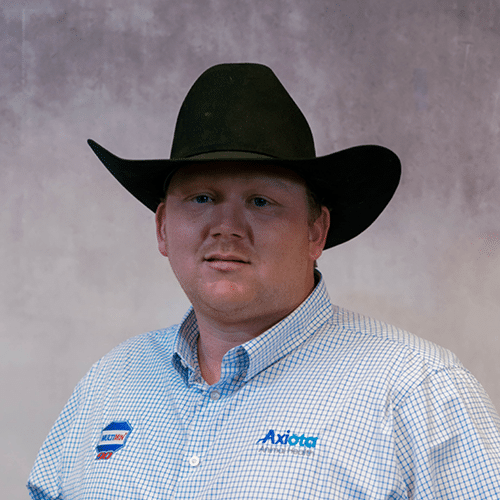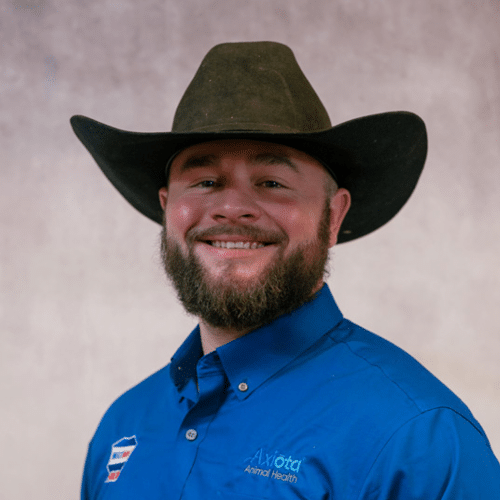
As the days get shorter, fall harvest and preg checks signal that it’s time to start preparing for calving season. While the anticipation of a new calf crop and new genetics is exciting, calving season always comes with plenty of challenges. Weather-related events, dystocia, cows not claiming calves, sickness in young calves, and lack of sleep can all wreak havoc on producers. But of these challenges, neonatal calf diarrhea has the greatest impact on calf health and performance outcomes.
Neonatal calf diarrhea is a disease that typically affects calves during the first 30 days after birth. Pathogens such as E. coli, Cryptosporidium and bovine rotavirus and coronavirus are the predominant causative agents leading to acute diarrhea, severe dehydration, and death if not caught early and treated. These pathogens are shed in feces of adult cattle, causing environmental contamination in calving areas, resulting in transmission to newborn calves. Calf scours is the cause of 57% of mortalities in unweaned calves. Dealing with scouring calves can be costly and unrewarding for producers. To prevent the hardship of this challenge, it’s critical to focus on three key areas – management, nutrition and colostrum quality.
Management
Considering neonatal diarrhea pathogens reside in feces, management of calving facilities is crucial for prevention. Depending on your calving system, producers should consider animal density per calving area or pen and cleaning out confined calving spaces frequently. But even despite these best efforts to maintain sanitation and prevent scours, there are external factors that cause management challenges, such as weather, available space and equipment limitations.
Nutrition
Providing proper nutrition is often easier to control than environmental management. A cow’s nutritional status during the last trimester of gestation impacts several critical factors such as immune response to scour vaccines, quantity and quality of colostrum, level of antibodies in colostrum, and her the calf’s health and survival after birth. A complete nutrition program includes sources of energy, protein, and minerals – both macro and micro. Trace minerals such as copper, zinc, manganese, and selenium are required in very small amounts in the diet; however, if the feed source is trace mineral deficient prior to calving, fetal development, colostrum production and immune function can be affected. These trace minerals are critical for supporting colostrum quality and antibodies which impact the innate immune system, providing protection from calf scours.
Oral supplements are required throughout the year to supply key trace minerals, but an oral program alone can present several challenges such as seasonal and individual intake variations, and low absorption due to antagonists, such as iron, sulfur, molybdenum, and calcium. Antagonists are present in the soil, forage, and water and can decrease copper absorption by 62%. Drought can be another challenge that impacts forage quality and availability which can lead to low BCS scores prior to calving, increasing the risk for weak calves. During these challenges, cattle need additional supplemental support. Injectable trace minerals (ITMs) quickly and effectively improve trace mineral status of cattle during critical events as they change trace minerals levels in the blood within 8-10 hours and are stored in the liver within 24 hours. They are highly absorbed, do not compete against antagonists in the rumen and can quickly supplement cows grazing deficient forages, thus making ITMs a great complement to a good oral program during drought conditions or even normal grazing.
The importance of colostrum quality
The third and most critical element to manage in prevention of scours is colostrum quality. Good quality colostrum and consumption within the first few hours after birth is the primary source of maternal antibodies and promotes early protection to defend against bacteria and viruses. Failure of passive transfer occurs due to poor quality colostrum, reduced or delayed colostrum intake, or malabsorption. Poor quality colostrum does not provide adequate levels of antibodies or IgG, and thus the calf does not have adequate protection against pathogens and is more susceptible to scours.
While colostrum supplies vital antibodies, it contains virtually no trace minerals. This absence is compensated for by the transfer of trace minerals from the cow to fetus through the placenta during the last trimester. This nutrient transfer will have a major impact on calf’s health and trace mineral status in the first 100-150 days. A calf is born with 2-4 times the liver trace mineral status of the cow – so ensuring the cow is well supplemented in the third trimester to prepare for cow-to-calf transfer is critical.
Strategic injection of trace minerals at pregnancy check or scour vaccination has shown to be an effective method to stimulate the cow’s immune system, support cow-to-calf trace mineral transfer and increase antibody levels in the colostrum. Studies indicate that administering ITMs at time of scour vaccination to bred cows and heifers during the last trimester has resulted in higher antibody titer levels, creating a more robust immune response to scour vaccine, thus increasing colostrum antibodies and enhancing protection from scours. Therefore, a trace mineral injection during the last trimester can be considered a 3 for 1 dose, supplementing the cow, fetus, and colostrum quality, resulting in better ROI and protection from calf scours.
A management tool for successful calving
Ensuring cows receive key trace minerals prior to calving is necessary to support colostrum production, cow-to-calf trace mineral transfer and cow and calf health. Supporting a good oral program with injectable trace minerals during periods of high demand and stress, such as pre-calving time, provides confidence that every animal treated is supplemented with the trace minerals needed for a healthy start. A well supplemented herd will see enhanced vaccine response and improved colostrum quality, delivering better protection against calf scours and peace of mind for the producer at calving time.
Please consult with your local veterinarian on proper use of injectable trace minerals and formulating vaccination and herd health protocols for calving season.




























